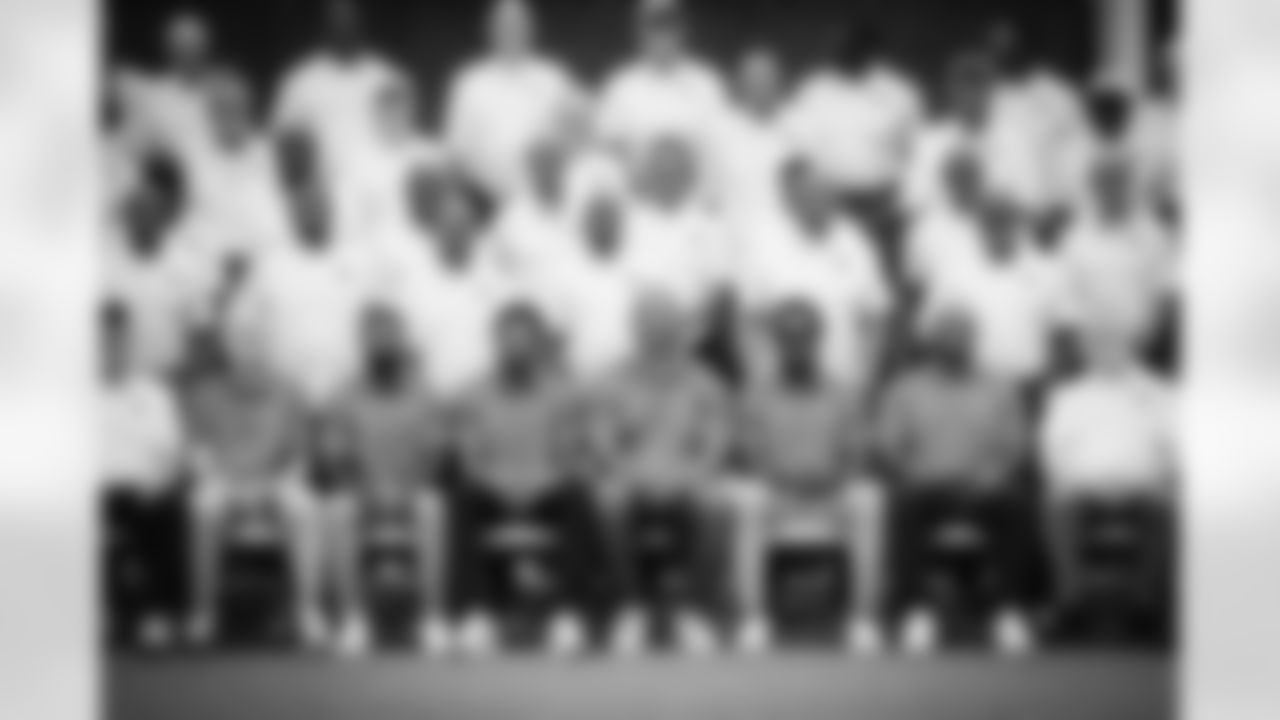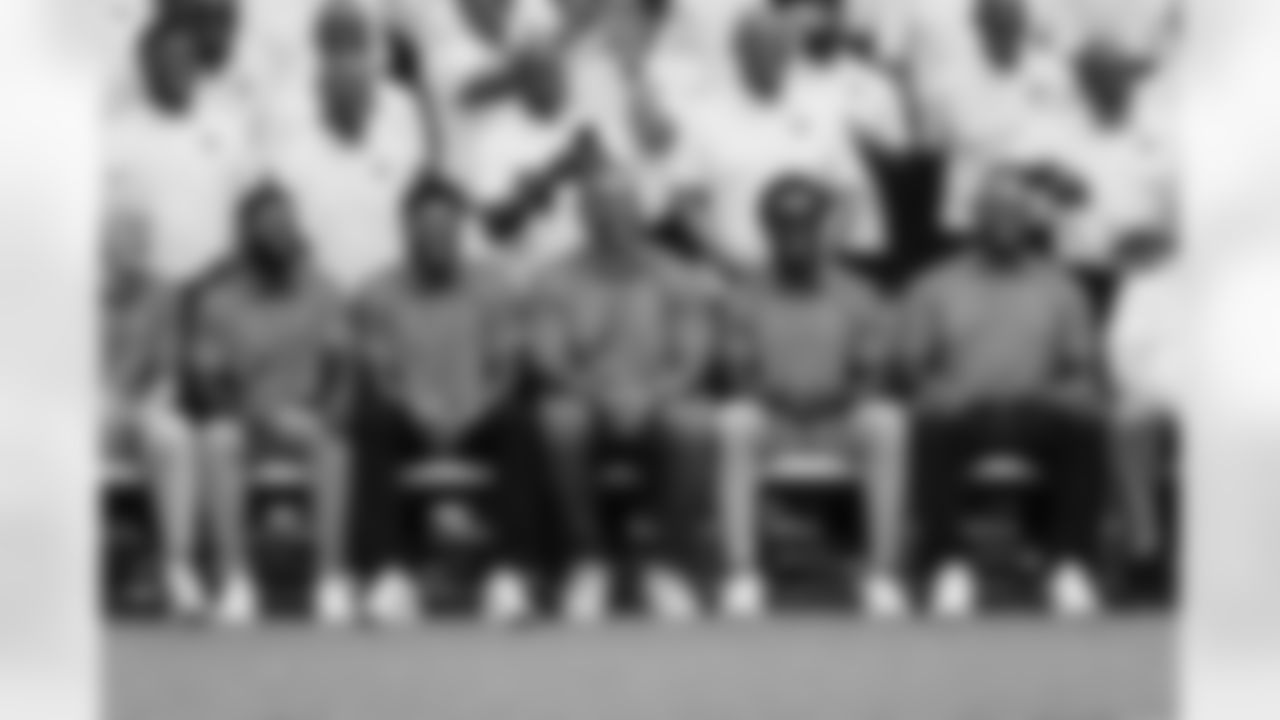CANTON, Ohio — To do the things required to reach the pinnacle of a sport requires talent, obviously. If you aren't strong or fast or both, you'll never make it to a place like this.
And Julius Peppers is talented, obviously.
But talent is just a starting point. To reach a destination like the Pro Football Hall of Fame takes a lot more than physical gifts. You have to be willing to work.
And for Julius Peppers, that road started a long way from the Central Ohio birthplace of football, or a football field at all. If you ask Julius Peppers how he got to this place, to this point, the story starts in a cucumber field in Eastern North Carolina.
"My motivation was, in the summertime, I used to work on farms," Peppers said earlier this spring, shortly after being named member number 377 of the Hall of Fame and seeing where his bust would be placed among the legends. "I used to go to apple fields, cucumber fields, watermelons, all of that.
"So that was part of my motivation to get out of there. I didn't want to go work no more farms. I didn't want to do no more field work. So I was like, I'm going to put this work in, I'll become an athlete, and I'm getting out of here."

To understand Julius Peppers in a gold jacket in Canton, Ohio, you have to go back to the farms in and around Bailey, N.C.
Peppers can laugh about it now, and he does laugh, that distinctive baritone that starts low like a rumble of thunder in the distance on a hot summer afternoon. But make no mistake, those formative experiences were not something he enjoyed.
"I hated it. I hated it. I absolutely hated it," Peppers said. "This would be the time of the year when school is getting out, everybody's getting out for school, and everybody would be excited. Oh yeah, this summer we're going to travel, or we're going to do whatever they do during the summer. But I was thinking it's time to go to work. It's time to go out there and do whatever we had to do, whatever crop was ready to be harvested; that's what I was getting ready to go do."
It wasn't anything he wanted to do. He was there partly out of financial necessity, and partly because his mother Bessie Brinkley didn't have a place to put him while she worked those same fields.
So, while a lot of middle-schoolers were going to camps or traveling with their families, Peppers was by his mother's side in tobacco fields or picking produce, the kind of labor no one dreams of.
"We're out there in the heat, with the bugs, animals, snakes, all that. It was tough," Peppers said. "Looking back, man, it gave me what I needed, but that's not an easy lesson for me. That's one of those things I wouldn't wish that on nobody to go through. I don't know many people who did it. None of my peers were doing that during the summer.
"I was out there with grown people, grown men trying to feed their families and stuff. It wasn't fun at all."
Fun's a luxury, and he realizes that now. And as he reaches milestones like this one, he can finally appreciate it, and celebrate with the people who worked alongside him.

To understand Julius Peppers, it helps to start at the beginning, and that takes a little work.
Bessie Brinkley is a quiet woman, who would rather let other people do the talking. (Sound familiar?) "You can try," Peppers said with a laugh. "But I'm not going to promise you're going to get a lot out of her." And it takes a little coaxing to get the woman they call "Miss Faye" to tell the stories at all, but once you get there, it's meaningful. Nothing wrong with work.
Julius was the third of Brinkley's three children and the big one. Nine pounds, 14 ounces at birth, and he kept getting bigger as he went.
"People always thought he was older than he was," Brinkley said with a laugh.
There's that laugh again. Sounds familiar. About that laugh. When you talk to Miss Faye, you hear that laugh that starts out low like a rumble of thunder in the distance on a hot summer afternoon. It's the exact same laugh her son laughs now, identical in expression.
So conversations can be brief, but that laugh is never far away.
"Oh Lord, we never really talked a lot; we just knew what each other was thinking," she said.
Talk to Miss Faye for a minute, and you learn a lot about Julius Peppers. Talk to her for a half hour, and you learn practically everything you need to know.

Like her son, she doesn't sugarcoat those long summer days working in the fields. It was hard, and nobody liked it. But life was hard, so you worked through it.
Bailey was not the easiest place to grow up, a town of fewer than 600 people, and out by Green Pond, even fewer.
"We had a pond and a store, not a grocery store, but more like a convenience market," she said. "It wasn't big at all."
Miss Faye lives in Raleigh now, and comfortably, but she goes back every Sunday for services at the Union View Original Free Will Baptist Church, and on that ride, she drives by those familiar fields, the places she'd work alongside her large son, and the small home with the dirt basketball court outside where her baby boy would play when he wasn't working.
She laughs when she's asked about her son's origin story about those summers on the farm, saying that at first, he was "kind of lazy." (In fairness, what child wants to pick cucumbers all summer?)
"Well, maybe lazy is not the right word, so I'm trying to think of another word I can use," she added. "But I'll just say this: he couldn't have made it on the farm."
For one thing, when she grew up as one of nine children in her family, the economic demands were different. Peppers didn't grow up well-off by any means, but this was a different time and a different kind of poor. So, while she's not disputing that her son worked, it was just different for him.
"Maybe he thinks it was hard. To him, it was hard, I guess," she said. "But there were times he pulled more vines than he picked cucumbers."
And again, she laughs.

However many cucumbers he got in a basket, the real harvest was the work ethic which drove him to this height.
He was obviously gifted, and from a young age found that escape from the farm on the athletic fields, running track before that fateful tryout for the high school football team, playing AAU basketball, anything he could because he was good at it.
And maybe because he was so gifted, he made it easier for people to think he wasn't working hard.
The Panthers had to fight through that perception when they chose to draft him in 2002 because one of the (now obviously false) myths at the time was that he didn't play hard at North Carolina, or that he took plays off. The reality was he didn't get many plays off at UNC, and was so graceful that it looked easier than it was for anybody else.
But when he walked into a defense full of veterans, they saw the work.
"When he came in, he went hard," former teammate Brentson Buckner said. "He's such a fluid mover that you can look out there and say, oh, he's not playing hard but because it was easy to him, and God don't bless a lot of people with that. We're there, we've got to try, we're sweating, we're grinding. But he could cover ground and move. He played to the most of his natural abilities and his natural abilities were great.
"And then we'd always say, wait until he learns the game, wait until he learns what he's doing because he didn't know what he didn't know. When he came in, he just won off ability. Pep, go beat this guy for a second. When he came, he just did stuff with raw ability that looked so easy for him."

It was defensive line coach and eventually defensive coordinator Mike Trgovac's job to teach him.
Trgovac had coached some of the great ones already, and he was eager to work with Peppers. And he worked closely with him to improve fine points like hand placement, the little techniques that make a huge difference when you pair it with talent.
"I think the veterans saw how serious he was, how serious he took his job," Trgovac said. "I think they all took to him just because they saw how serious he was about his craft. He was a gifted athlete but he was just OK with his hands, not great with his hands.
"And that's what I really tried to improve with him just becoming better with his hands, doing hand drills and stuff like that and doing moves that would make him great. He was very receptive, always. A lot of those guys that come in in the position that he came in, they think they know most of it already."
There were other little signs that the rookie was different. When former strength and conditioning coach Jerry Simmons would have players run gassers, he incentivized attendance. Guys who made all the workouts during the offseason had to run sets of four, and the guys who weren't regular attendees had to do six at a time.
"He'd go run his four with the linebackers and pace them, and the D-line looked like they were struggling, and he looked like he was out for a Sunday stroll," Trgovac recalled. "And he only had to do his four, but then he'd go run the other two with somebody else. That's just the kind of teammate he was."

He was also mindful of his own body at an age when a lot of players aren't. To last 17 years in the league requires incredible fortune, but also work in a lot of ways that don't come naturally for young players.
"That was something that I learned from him," running back DeShaun Foster said. "Like, it didn't matter if you're going on vacation; he still doesn't get off the training. I mean, like first thing in the morning. I was just impressed that no matter what, he's still locked in, taking care of his body, and going to make sure that he's still training and getting the most out of himself."
That kind of daily discipline became more pronounced over the years, even when he came back to the Panthers for his final two seasons, and the established stars saw what it meant to him.
"At that point, we were trying to take care of him like, 'Hey, Pep, what do you need,'" Linebacker Luke Kuechly said. "But he worked hard; he was in the weight room. I always felt like whatever Pep needs to do to be ready for the game, that's what he needs to do. So if he needs five reps at practice and if Pep wants to go full speed, great. If he wants to work on something and go 75 percent, great. Just whatever you've got to do to make sure that you're ready to go in the game.
"And then, in the game, effort was never an issue. I think that's kind of the real measure. I think it has less to do with practice and more to do with how much Pep wanted to win. And I think he knew at that point in his career, these are my last two seasons. I want to do everything I can to help us win."
It's a common trait among the great ones.
Quarterback Jake Delhomme had been around the block before he came to Carolina (from New Orleans to Frankfurt and back), and what he saw in Peppers was something familiar to him from his early days. Delhomme got to know Saints tackle Willie Roaf, who is also a Hall of Famer, and marveled at the fact that Roaf never took a practice off, though he deserved plenty as a veteran, because he didn't think it was fair to his teammates.
"And here is our best player, and it's not even close, practicing his ass off every day, and he never took a practice off, he never took plays off," Delhomme recalled. "And I saw Julius do the same thing. I don't remember Julius missing a practice. I don't. He could have taken an afternoon off, and nobody would have said a thing, but he showed up every day, and he worked his ass off."

Left tackle Jordan Gross might have preferred it another way. He was the guy who had to block Peppers, and knew the intensity matched the talent. And he also knew that Peppers had the ability to be smart, rather than just raging the entire time.
"That's the highest compliment I could give him, because he could have surely taken days from time to time," Gross said. "He always went hard. He was probably a better practicer than he was a football player. By that, I mean he could go full speed until the moment of disaster and then let off and also save me from falling into the pile. But hard all the time.
"Every time we did one-on-ones, every time we did half-line runs, every time we did team stuff, I was getting his practice best, which is only second to his game best. And every day, you know there's no deals, no secret handshake, hey we're going to both take it easy here. He was just a professional in everything he did. It was awesome."
And to do it that way for 17 years was even more impressive.
"He made a boatload of money, and it would have been easy for him to throw in the towel earlier because, 'Hey, let's go live a good life,'" Gross said. "Especially coming back here the second time through. I mean, he clearly did not have to do that. You did not need the money.
"It said something about how much he enjoys the game and his teammates. But, yeah, if everybody would practice like him, man, you'd have a heck of a good team."

And now, he's a part of the greatest team of all time, in the Pro Football Hall of Fame.
And he gets to celebrate it among the ones he loves the most.
Miss Faye is here, and she is resplendent, and she laughs that laugh that sounds so familiar. It's the same laugh you can hear Peppers laughing as he sees Orlando Pace running up late to the Hall of Famer team picture.
It's a family thing.
And that's important to have on a weekend like this, which is a celebration. His fiancee Claudia has been by his side throughout, as have his three children, Keana, Elijah, and Amare.
"It's been great because that's what all of this is about, right?" Peppers said Friday. "This is about the people that you love and your family, the people that you care about. All of these experiences and things that we have and go to really don't mean anything if you don't have anybody special to share it with.
"So I'm really blessed and fortunate to have my fiancee and my kids come with me all the time, mostly everywhere to events and stuff like this because, you know, that's my crew, and I love sharing these moments with them."
"He's a good dad," Miss Faye said. "He's a little more, I guess the word would be lenient than I was with him."
And then she laughs again.

These are the important things. These are the things you work a lifetime for, to be able to celebrate moments like this with the people who are important to you.
His mother has been all smiles this weekend, but earlier in the summer, she grew quiet and reflective for a moment when she was asked a simple question. What was she proudest of her son for?
"Well, all his accomplishments he made," she began. "But mostly, just the kind of person that he is."
That character she's proud of, that he displayed so often, isn't something that's naturally occurring or given like a gift.
It's something you have to work for.
Even if that means picking tobacco and produce when you're 10 years old, long days in hot fields alongside grown men for whom it was the destination and not the start of a journey that ended with a gold jacket and a bronze bust.
"I came to appreciate it as I got older because it instilled a work ethic, it instilled a discipline," Peppers said. "And it gave me the foundation that I needed throughout life and through adulthood. So at the time when I was doing it, I hated it, I couldn't stand it.
"But as I got older I realized that it really made me who I was, and it helped me become who I became."
See photos of the Panthers Legend as he arrives in Canton, Ohio, to receive his gold jacket from the Pro Football Hall of Fame.





































